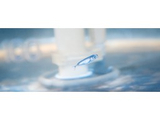Yoni Zohar explains how they got there
UMBC’s Yonathan Zohar, professor and chair of marine biotechnology, offers a glimpse into his groundbreaking work farming bluefin tuna in land-based aquaculture through a new, in-depth interview with the Baltimore Business Journal.
Zohar and his team of researchers, including John Stubblefield, faculty research assistant, Jorge Gomezjuardo, faculty research assistant, and Odi Zmora, research supervisor, start with bluefin tuna eggs from halfway around the globe and carefully grow them to larvae to adult stage at the Institute of Marine and Environmental Technology (IMET) in Baltimore. Their goal is to develop a sustainable way to farm the tuna in closed aquaculture systems, cultivating a healthy food source while also protecting wild bluefin tuna populations, which are rapidly decreasing.
“Tuna is a fish that has been largely and strongly overfished in the marine environment,” Zohar explains.
Zohar and his team successfully brought bluefin tuna to the juvenile stage in 2015, reaching an important new milestone in land-based aquaculture. “The bottleneck was always the first 25 to 30 days, and this year we were able to open that bottleneck,” he says. “We had bluefin juveniles that were about 60 to 70 days of age.”
Previously, the team’s work was focused on “developing technologies to induce commercially important marine fish to spawn in captivity.” The researchers were able to determine one hormone in the brain that jumpstarts the tuna’s reproductive processes.
Zohar notes that one of the keys to successfully raising tuna to the juvenile stage is developing a feeding protocol. “They had to be fed a diet that would mimic what they eat in the wild, which we don’t know exactly, and because tuna grow so fast they had to be fed with different types of live organisms at very high densities,” he explains.
Looking ahead, Zohar wants to raise the tuna in larger tanks or ocean-based floating nets, and aims to grow the tuna to weigh approximately 50 pounds. Although this is much smaller than bluefin tuna that live in the wild and weigh around 500 pounds, it would represent a remarkable step forward in tuna aquaculture.
Image: Bluefin tuna. Photo by Marlayna Demond ’11 for UMBC.
Tags:
Posted: March 30, 2016, 11:03 AM
